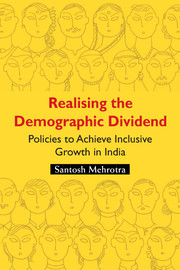Book contents
- Frontmatter
- Contents
- List of Tables and Figures
- Preface
- Acknowledgements
- Part 1 Growth, Employment and Inclusion
- Part 2 Human Capital Formation
- Chapter 8 Addressing Capability Deprivation of Women for Inclusive Growth
- Chapter 9 From the Right to Education to the Right to Learning
- Chapter 10 Food Security, Nutrition and Health: Policy Dilemmas and Interlinked Challenges
- Chapter 11 Redesigning Sanitation Programmes to Make India Free from Open Defaecation
- Part 3 Building a System of Social Protection
- Part 4 Governance
- Index
Chapter 8 - Addressing Capability Deprivation of Women for Inclusive Growth
from Part 2 - Human Capital Formation
Published online by Cambridge University Press: 05 June 2016
- Frontmatter
- Contents
- List of Tables and Figures
- Preface
- Acknowledgements
- Part 1 Growth, Employment and Inclusion
- Part 2 Human Capital Formation
- Chapter 8 Addressing Capability Deprivation of Women for Inclusive Growth
- Chapter 9 From the Right to Education to the Right to Learning
- Chapter 10 Food Security, Nutrition and Health: Policy Dilemmas and Interlinked Challenges
- Chapter 11 Redesigning Sanitation Programmes to Make India Free from Open Defaecation
- Part 3 Building a System of Social Protection
- Part 4 Governance
- Index
Summary
Introduction
As half of the human race, women have a human right to be treated equally. In other words, there are intrinsic reasons why gender equality is a human right of women. However, much of this chapter deals not mainly with this intrinsic and constitutive human right, but with the instrumental reasons why gender equality is good for the economy and good for the quality of life of all its citizens, not just its women. Gender equality is important for economic growth for a variety of reasons. First, it makes it possible for women to control their reproductive rights; their reproductive rights are an essential element in lowering the total fertility rate, which in turn has a direct impact on per capita income growth. Second, women's status in society directly impacts the quality of the care imparted to children, and thus through the quality of physical and intellectual upbringing of children, impacts the quality of the workforce. Third, where women are educated and thus enter the non-agricultural labour force, women contribute to value added in industry and services, given that productivity levels in the industrial and service sectors are higher than in agriculture (which is where most women are ‘employed’ in agrarian societies).
Yet, gender inequality is pervasive in India – as this chapter demonstrates, on all the counts that the author listed above. First, population growth has been seen at different times as a major impediment to income growth in India. However, the fertility rate of Indian women especially in North India, could still drop sharply, provided health services could meet the needs of family planning services. In fact, unmet need for family planning is an important though not an overwhelming reason behind involuntary pregnancy. A main source of higher than optimal number of children being born to a woman is simply that the family's demand for children, especially sons, is itself high, since the household has no social insurance, and therefore perceives children as an insurance against old age (a subject that has been dealt with in chapter 13). But another very important problem is that in Indian patriarchal society, the woman does not have any control over her reproductive rights; the decision in regard to whether or not to become pregnant is left with the husband (or the husband's family).
- Type
- Chapter
- Information
- Realising the Demographic DividendPolicies to Achieve Inclusive Growth in India, pp. 231 - 262Publisher: Cambridge University PressPrint publication year: 2015



